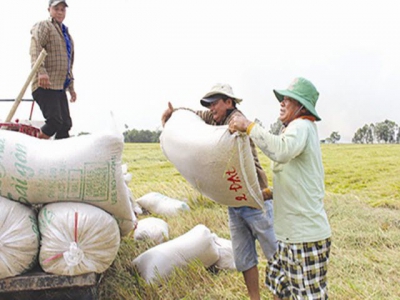New decree paves way for more rice exporters to join market

Decree 107, which replaces another decree on rice export management, is feared to lead to unhealthy competition and lower Vietnam’s export prices.
In the past, under Decree 109, enterprises had to satisfy strict requirements, including those on storehouses and factories, to be eligible to become exporters. Many enterprises could not satisfy the requirements, and the number of licensed exporters dropped from 150 to below 100.
The strict regulations tightened control over rice exports, after economists pointed out that exporters “offered surprisingly low export prices” in a scramble for clients.
Decree 107, which replaces another decree on rice export management, is feared to lead to unhealthy competition and lower Vietnam’s export prices.
However, Decree 109 was not welcomed. Economists criticized the legal document, saying that the restrictive regulations would deprive enterprises of business opportunities. They said instead of building factories and storehouses themselves, enterprises could lease the facilities to save financial resources and optimize the use of society’s resources.
Decree 107 was issued to replace Decree 109. Pham Quang Dieu, CEO of Agromonitor, a market analysis firm, said with the new decree, barriers have been removed, thus paving the way for enterprises to easily join the market and help them cut costs.
Tran Thanh Hai from the Ministry of Industry and Trade’s (MOIT) Import/Export Department said businesses now can export rice without any restrictions and required certificates.
They do not have to have a storehouse and husking factory. In addition, they do not have to register their rice export contracts with the Vietnam Food Association (VFA). The previous requirement was that exporters must have at least 50 percent of export volume in stock when registering export contracts.
This aims to encourage businesses to invest in production to export high-quality rice products.
“The amendments will help enterprises cut production costs and capital costs, and lift the worry about information security, thus improving the competitiveness of Vietnam’s products,” Hai said.
Nevertheless, the concern about unhealthy competition among rice exporters has once again been raised.
Do Ha Nam, chair and CEO of Intimex, an import/export company, warned that when there are many companies on the same playing field, competition will be inevitable.
“Many enterprises offered very low prices in bidding. This not only causes big losses to them, but also affects the entire rice production sector,” Nam said.
Hai from MOIT noted that winning bids though setting high prices is what everyone wants. However, it is necessary to have cooperation and confidence among state management agencies, VFA and exporters to achieve this.
Meanwhile, Dieu said there was no need to worry about competition among exporters. Businesses follow their specific strategies, which need to be respected.
Có thể bạn quan tâm
 Arriving at the new orange fruit growing in Binh Thanh
Arriving at the new orange fruit growing in Binh Thanh Orange fruit trees started growing in Binh Thanh in 2008. Up till now, the area of citrus fruit trees, mainly orange trees, has reached nearly 40 hectares
 Restructuring helps form agricultural product categories
Restructuring helps form agricultural product categories One of the main achievements of Vietnam’s agricultural restructuring plan over the last five years is the formation of three product categories
 Dong Thap rice farmers switch to other crops, incomes rise
Dong Thap rice farmers switch to other crops, incomes rise Farmers in the Mekong Delta province of Dong Thap have begun to use more than 3,000ha of low-yield rice fields for growing fruits and other crops this year.